Shostakovich – Lady Macbeth of Mtsensk
Boris – Alexander Teliga
Zinoviy – Gert Henning-Jensen
Katerina – Anne Margrethe Dahl
Sergey – Johnny van Hal
Aksinya – Cornelia Beskow
Workman – Magnus Gislason
Steward – Lasse Bach
Priest – Petri Lindroos
Police Inspector – Lucas Bruun de Neergaard
Nihilist – Torleif Steinstø
Old Convict – Per Høyer
Sonyetka – Hanne Fischer
Female Convict – Elisabeth Halling
Sergeant – Morten Staugaard
Sentry – Albin Ahl
Det Kongelige Operakor, Det Kongelige Kapel / Alexander Vedernikov
Stage director – Peter Konwitschny.
Operaen, Store Scene, Copenhagen. Friday, November 14th, 2014.
This was my first visit to the Copenhagen Royal Theatre’s opera house and it is a wonderful building. Deeply imposing from the outside with a canopy welcoming visitors in from the water it is a handsome theatre indeed. I don’t think photos do justice to the experience of walking into this stunning venue, with the beauty of old Copenhagen on the other bank. Ticket prices, perhaps surprisingly, are extremely reasonable and sightlines are excellent. The quality of the orchestra and chorus is unmistakable and a credit to the house. It deserves a place on any opera-lover’s plans.
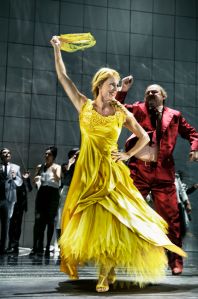
Peter Konwitschny is known a fascinating director – one who can thrill and frustrate in equal measure and this version of Lady Macbeth of Mtsensk was never less than interesting. If I felt that it really only hit its stride in the final scene, this is in no way a reflection of the outstanding dedication of this vast cast or the excellence of the singing. The action almost completely takes place in a white tiled room. The chorus is dressed in grey and black, while the principals are dressed in bright colours – yellow for Katerina, red for Boris, blue for Sergei. The stage curtain drops during the interludes and its colour changes to match the colour of the character who is the focus of the previous scene. The main issue in this for me was that the bright colours gave the performance more of a cartoon quality than was absolutely necessary as if unwilling to take the work seriously. In the sex scene with its salaciously filthy orchestration, this approach worked well. However, in the opening scene, with Katerina goose-stepping around the stage like a petulant teenager, we didn’t really get a full impression of the complicated combination of boredom, petulance, calculation and vulnerability of Leskov’s character.
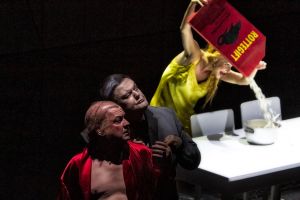
In an interview in the program, Konwitschny mentions that ‘woman … is still only a footnote in male society – man’s servant and property’. The main issue I have with his staging is instead of perhaps challenging these notions and drawing out the multifaceted nature of Katerina’s personality, he perpetuates them by focusing solely on the binaries of comedy and tragedy. I found in this staging that Katerina could only be a figure of comedy or a figure of tragedy. There were a few moments where there were exceptions – when Katerina rescues Aksinya from the workers, she displayed a tenderness and strength that was missing elsewhere. For me, the staging really only found its feet in the final scene where Katerina, humiliated, finds the freedom to take her own destiny in hand. This was especially striking and had undeniable impact. The only problem was that Konwitschny did something completely unmusical by adding a five-minute speech in Danish between the penultimate and final scenes completely ruining the effect and breaking the atmosphere.
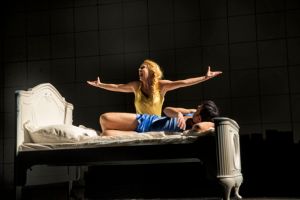
The lighting (Guido Petzold) was exceptionally fine – with a fluency and logic that was deeply impressive. I particularly liked how, in the final scene, the black of the back of the stage developed into a new pattern that reflected the mushroom that appeared when Boris was killed. Personenregie was highly detailed and the characters – at least in this interpretation of them – were sharply drawn.
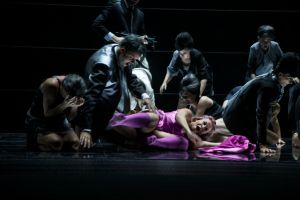
Musically this was an evening of the highest quality, fully demonstrating the excellent depth of casting that the Royal Theatre enjoys. Anne Margrethe Dahl was a superb Katerina. The voice has a limpid beauty combined with a hint of metal in the tone which was perfect for this role and certainly an improvement on the screamers we often hear in the part. If she lacks a little weight in the lower reaches she more than made up for it with her striking high notes and she had the strength to make herself heard above the large orchestra. I won’t admit to being a Russian language expert but her diction and that of the whole cast seemed to be very clear. Johnny van Hal was likewise a very impressive Sergey. A striking actor the voice has a richness that is highly listenable and an ease throughout the range. Aleksander Teliga’s Boris brought rock-solid vocal strength and real dramatic engagement to the role. He painted the words with great care and the voice carried exceptionally well. One singer I particularly enjoyed was Petri Lindroos as the priest – again the voice has a real firmness, depth and strength that is most striking. I wouldn’t mind hearing him as Mussorgsky’s Boris at some point, I imagine it would fit him very well. Hanne Fischer’s liquid contralto made a real impression as Sonyetka with a voice of genuine richness and amplitude. There were no weak links at all in the rest of the cast.

The Royal Opera Chorus sang with tight ensemble and rich tone. Prepared by Bo Lundby-Jæger, they sounded completely at home in the idiom singing with a depth of tone that sounded like it came from the very heart of Russia. The Royal Orchestra played with supreme virtuosity, every section playing at the top of its game – not a weak link anywhere. The excellence of the massive brass section was especially notable. They were led in a highly idiomatic account of the work by Alexander Vedernikov. Tempi were chosen to perfection and the hours flew by.
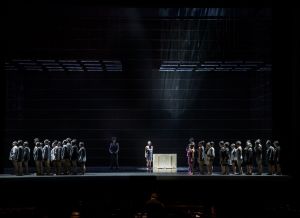
I have for a long time resisted putting star ratings on these reviews as I feel that rather than reading a detailed consideration of the show, some focus on the star review rather than anything that was actually written. That said, I did ask myself here, how would I rate it if I had to reduce my thoughts on this show to five stars? The truth is that this is a deeply considered staging that had clearly had a lot of work put into it and was fully realized by this highly talented cast. Musically, it was of undoubted excellence but I felt that Konwitschny’s vision didn’t quite do justice to the full nature of Katerina’s personality. It was either comedy or tragedy but the grey areas were missing. It is undoubtedly a deeply stimulating staging and will provoke a number of reactions which indeed all of the best stagings should.
[…] Opera Traveller about Lady Macbeth fra Mtsensk […]